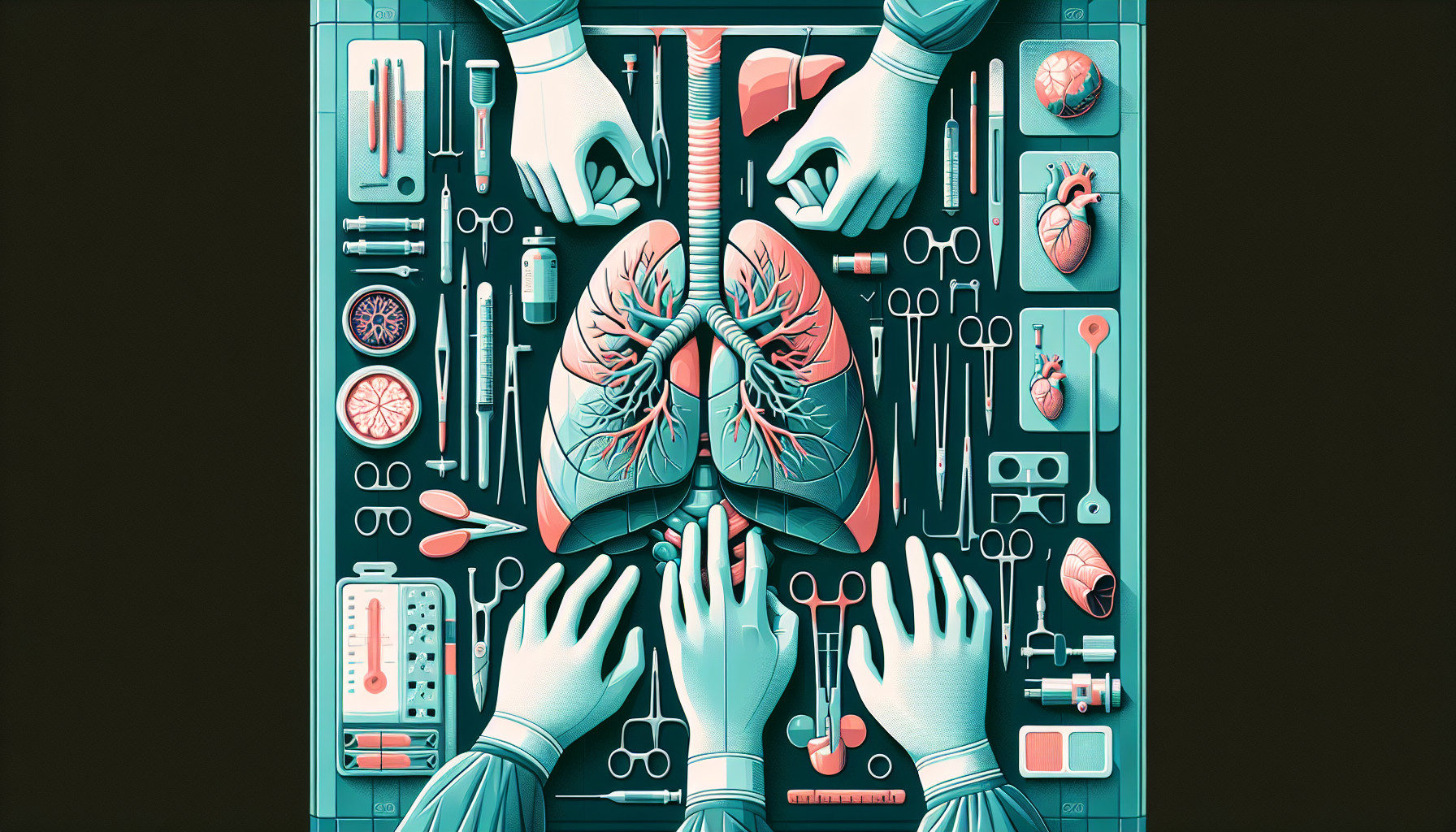Our Summary
The research paper looks at what factors can cause long-term lung function decline in patients who’ve had a certain type of lung cancer surgery, and how this decline can impact a patient’s lifespan. The study looked at 489 patients who had this surgery between 2010 and 2020. The team performed lung function tests before surgery and at multiple points after surgery.
The study found that two measures of lung function (forced expiratory volume in 1 second and vital capacity) initially decreased the most in the first month after surgery but then started to improve. However, one of the measures (forced expiratory volume in 1 second) plateaued, and the other (vital capacity) continued to improve even 6 months after surgery.
The researchers found that the number of segments of the lung removed during surgery was a risk factor for the decrease in both measures of lung function. Additionally, post-surgery complications were a risk factor for the decrease in vital capacity.
The study also found that a decrease in vital capacity 12 months after surgery was significantly associated with a shorter lifespan.
The main conclusion from this research is that a long-term decline in vital capacity, influenced by the number of lung segments removed and complications after surgery, can negatively impact a patient’s survival rate.
FAQs
- What factors were identified as risk factors for the decline in lung function following lung cancer surgery?
- How does the decrease in vital capacity following lung cancer surgery affect a patient’s lifespan?
- What are the two measures of lung function that were assessed in this study, and how did they change over time following surgery?
Doctor’s Tip
A helpful tip a doctor might give a patient about lung resection is to focus on post-surgery recovery and rehabilitation to improve lung function and overall health. This may include following a pulmonary rehabilitation program, quitting smoking, staying active, and practicing deep breathing exercises. It is also important to attend follow-up appointments with your healthcare team to monitor lung function and address any potential complications early on. Additionally, maintaining a healthy lifestyle with regular exercise and a balanced diet can help improve overall lung health and potentially increase lifespan after lung resection surgery.
Suitable For
Patients who are typically recommended for lung resection are those with early-stage lung cancer, non-small cell lung cancer, or certain benign lung tumors. Additionally, patients who have already undergone other treatments such as radiation therapy or chemotherapy and have not had success may also be recommended for lung resection. It is important for patients to be in good overall health and have adequate lung function to undergo this surgery successfully.
Timeline
- Before lung resection:
- Patient is diagnosed with lung cancer and undergoes various tests to determine the stage and appropriate treatment plan.
- Patient meets with a surgeon to discuss the possibility of lung resection as a treatment option.
- Patient undergoes pre-operative evaluations and tests to ensure they are healthy enough for surgery.
- Surgery is scheduled, and patient receives instructions on how to prepare for the procedure.
- After lung resection:
- Patient undergoes lung resection surgery to remove the cancerous tissue.
- In the first month after surgery, lung function (forced expiratory volume in 1 second and vital capacity) decreases the most.
- Lung function starts to improve after the initial decrease, with forced expiratory volume in 1 second plateauing and vital capacity continuing to improve even 6 months after surgery.
- The number of lung segments removed during surgery and post-surgery complications are identified as risk factors for decreased lung function.
- A decrease in vital capacity 12 months after surgery is associated with a shorter lifespan.
- Long-term decline in vital capacity, influenced by the number of lung segments removed and post-surgery complications, can negatively impact a patient’s survival rate.
What to Ask Your Doctor
Some questions a patient should ask their doctor about lung resection based on this research include:
How many lung segments will need to be removed during the surgery, and how might this impact my long-term lung function?
What are the potential complications that can occur after the surgery, and how might they affect my lung function and overall health?
How often will I need to have lung function tests done after the surgery to monitor any changes in my lung function?
What steps can I take to help improve my lung function and prevent long-term decline after the surgery?
How does a decrease in vital capacity after the surgery impact my lifespan, and what can be done to mitigate this risk?
Are there any specific factors in my case that may increase the risk of long-term lung function decline or complications after the surgery?
What are the potential treatment options or interventions available if I experience a decline in lung function after the surgery?
Are there any lifestyle changes or activities I should avoid to help protect my lung function in the long term?
How frequently should I follow up with you or a specialist to monitor my lung function and overall health post-surgery?
Are there any support resources or programs available to help me cope with any changes in lung function or complications after the surgery?
Reference
Authors: Tsubokawa N, Mimura T, Tadokoro K, Yamashita Y. Journal: Jpn J Clin Oncol. 2023 Mar 7;53(3):245-252. doi: 10.1093/jjco/hyac193. PMID: 36546715
